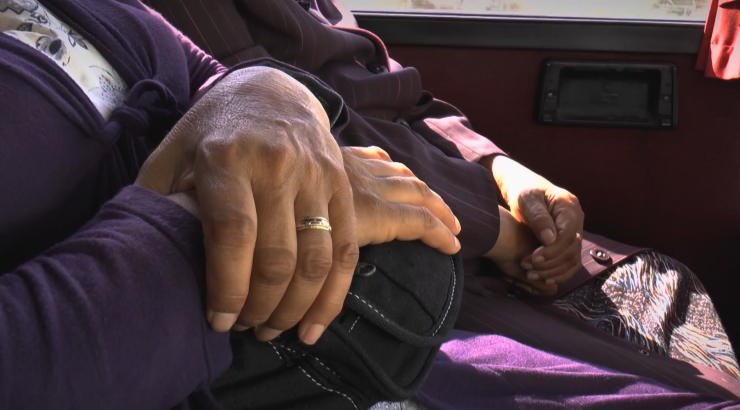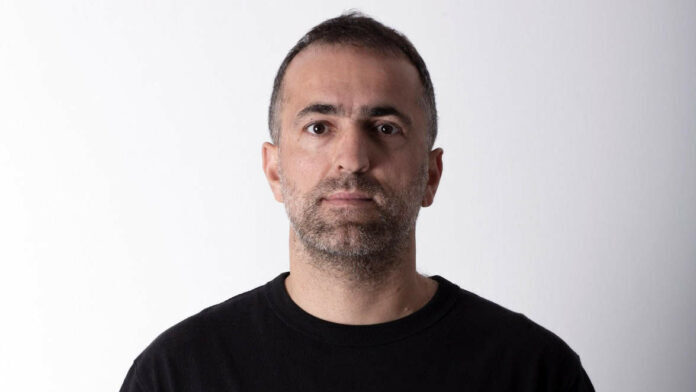
From the Screen to Our Hearts: Notes on Displacement Screening
December 19, 2024

Filmmaker Khaled Jarrar.
Chapman University’s MA in International Studies Program hosted Palestinian artist and filmmaker Khaled Jarrar for a screening of his acclaimed documentary Notes on Displacement. Co-sponsored by Political Science, Peace & Justice Studies, History, and Dodge College of Film and Media Arts, the event brought together students, faculty, and community members. This interdisciplinary gathering explored the pressing realities of displacement, migration, and refugee rights, fostering critical dialogue and reflection on global injustices.
Jarrar’s 2022 documentary Notes on Displacement portrays the journey of a Palestinian refugee family through their torturous experiences across multiple borders, and systemic obstacles, amidst dehumanizing circumstances in search of safety and dignity. By adopting an immersive and deeply personal narrative approach, Jarrar challenges conventional documentary practices, blending his voice as an observer and participant.
At its core, Notes on Displacement seeks to humanize the refugee experience. The film portrays displaced individuals’ resilience, dignity, and humanity, countering the reductionist lens that often sees refugees as mere statistics. Jarrar captures everyday moments of hope and struggle, contrasting the scenes of hardship with moments of joy, such as children playing in camps, to challenge media portrayals that dehumanize displaced individuals.
“[Jarrar’s work] offered our students a profound, firsthand perspective on the complexities of the Palestinian experience,” said Graduate Programs Coordinator David Krausman. “Blending art and activism, the film and conversation offered a unique insight into the human impact of geopolitical conflicts.”
The film also critiques the systemic injustices perpetrated by host countries. Through imagery and storytelling, Jarrar exposes exploitative policies, such as fingerprinting and detention practices, which reduce refugees to economic commodities within bureaucratic systems. He describes this as the “business of refugees” reducing refugees to economic commodities, with countries receiving financial incentives for registering or detaining individuals.
By integrating personal narratives with broader political commentary, Jarrar compels viewers to reflect on the universal crisis of belonging, identity, and resilience. His immersive approach blurs the line between filmmaker and subject, creating an intimate portrayal of displacement’s physical, emotional, and psychological toll.
Jarrar shared how his role evolved from a documentarian to an active participant in the narrative during the filmmaking process. “I went to witness, but my voice became part of the story,” he remarked. This dual role enriched the film’s authenticity and introduced challenges like navigating self-reflection and balancing advocacy with storytelling.
A recurring theme during the discussion was the importance of challenging stereotypes. Jarrar emphasized the need to portray refugees as multidimensional individuals, showcasing their resilience and humanity. “Even in the worst conditions, dignity and resilience exist. It is our job as storytellers to show that humanity,” he said. Jarrar aims to dismantle narratives that demonize or victimize displaced individuals by highlighting moments of joy alongside adversity.
Jarrar exposed the economic and political interests underpinning many host countries’ policies, revealing how refugees are reduced to commodities within these systems. He described the global refugee crisis as a humanitarian issue and a political and economic one requiring urgent attention and reform.
Jarrar highlighted the role of storytelling, music, and collective memory in sustaining cultural identity during displacement. “The fight is not just for survival but for preserving our narratives, constantly threatened,” he stressed. By documenting personal and collective experiences, Jarrar’s work contributes to a broader effort to resist cultural erasure and reclaim agency.
During the Q&A, Jarrar shared plans for his upcoming project, The Palestinian Black Panther, focusing on themes of solidarity, resistance, and creativity as tools for survival and activism and the grassroots movements that shaped his early years in 1980. This new work aims to celebrate the resourcefulness and determination of communities resisting oppression while drawing parallels to contemporary struggles.
“The movie strongly impacted and addressed critical social issues like human rights and immigration. However, it was sad to see so few audience members—it felt like a missed opportunity for more people to engage with such an important theme”, said graduate student Samah Abdalrahman (MA International Studies).
Jarrar’s closing words particularly struck attendees: “When we see injustice, we must act—not just with our voices but with our hands and hearts. Each of us has a role to play.”

